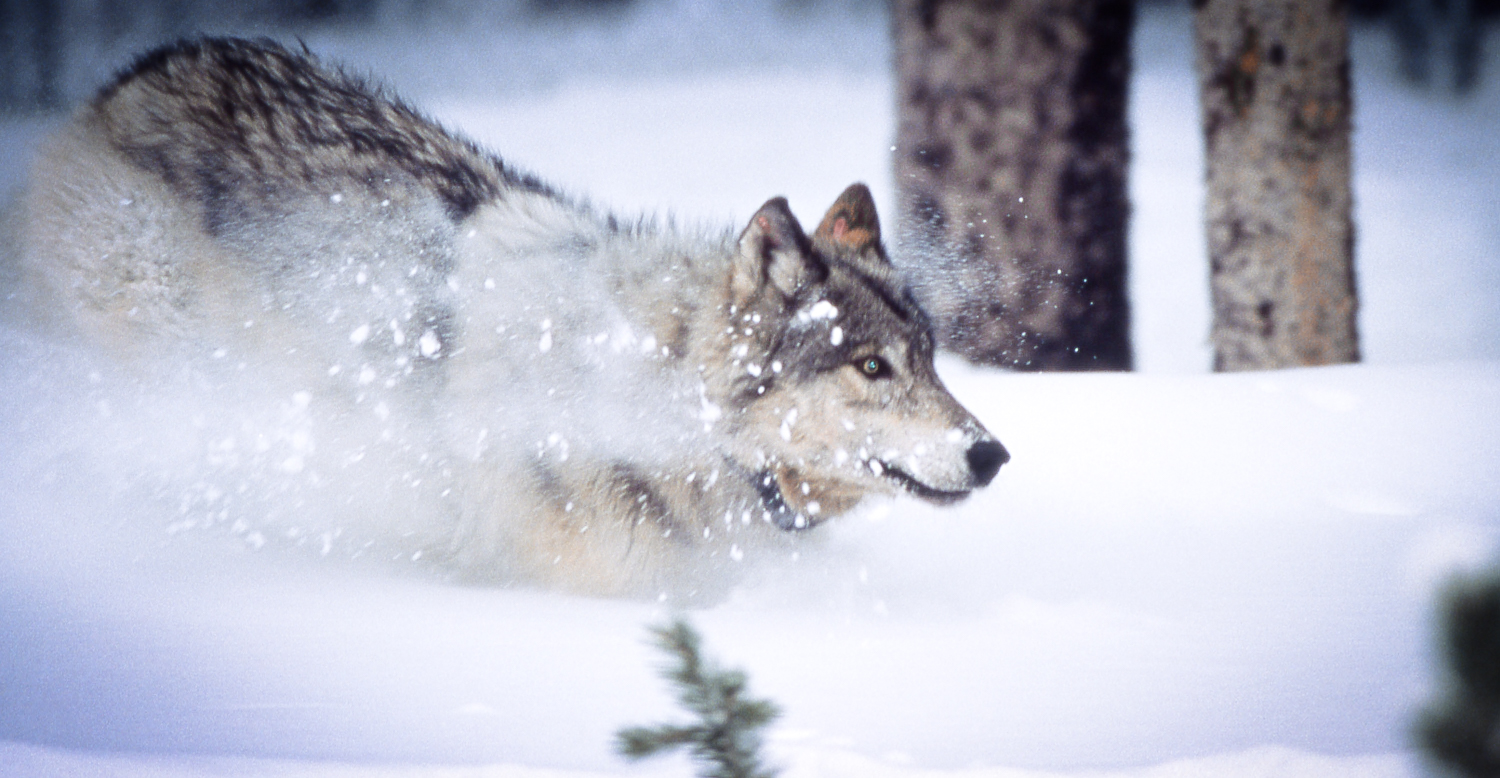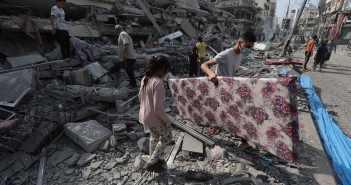‘I had a dream about you last night.’
Sarah, stuffing wet tuna into pitta pockets and wondering if she could just put the same tangerine, uneaten from yesterday, back into Noah’s lunchbox, stiffened. The now-familiar tightening of her neck, shoulders and arms at the sound of Juliette’s voice went through her like one of those lock-and-load scenes in shoot-em-up movies; a rippling of ‘click, click, click’, on and on until everything tensed.
‘Me?’ Noah said. He put down his spoon. ‘What dream?’
‘I dreamed first of a snow fox, then of a snow wolf.’
Sarah could hear Juliette settling into herself, into her dream and her visions. She leaned closer to the little boy. Her voice dropped; mysterious, revelatory. ‘The snow fox was running and leaping through deep, white snow, glad to be alive. Then the snow wolf appeared and at first it hunted the fox, but then they became one and together they were more powerful than before.’
‘Where was I?’ Noah asked. ‘In the dream.’
‘You were the snow fox, but then, when the wolf came, you were the wolf too. So I know now – a snow wolf is your spirit animal.’ She paused, for drama. ‘And Noah, it’s an incredibly powerful spirit animal. It means you have an appetite for freedom.’
Sarah wished there was a polite way to tell someone who sat in your kitchen, lived in your house, to shut up. Not someone though, Juliette. Juliette, who had the word ‘fearless’ tattooed on the inside of her arm, and ‘I was not built to break’ in curly script under her hipbone. Juliette, who marked herself before life could do it for her. As if that could stop anything.
Juliette. She had been christened Juliet, had added the final ‘t’ and the ‘e’ herself, ‘because it sounds better,’ she had once explained to Sarah.
‘But they’re silent,’ Sarah had protested.
‘Not entirely,’ Juliette had said, smugly. ‘They draw the sound out at the end, just enough.’
Enough for what Sarah had wondered? Enough to be incredibly annoying?
That was before Juliette, after yet another failed relationship, another failed attempt to live ‘a meaningful life’ – meaning she seemed to find only in weird diets and crystals, Sarah noted, never in work or anything useful – had come to live with them. Now, Sarah tried not to remark on anything she said, in case doing so prolonged conversations she didn’t want to have.
Are you finished in the bathroom? Can I change the channel? Those were the realms where she wanted conversation with Juliette to stay.
‘What is a spirit animal?’ Noah asked, not unreasonably Sarah thought. She closed the lunchbox with a snap.
‘Noah, finish up. You need to hurry,’ she said.
‘Your spirit animal is the shape of your soul,’ Juliette said, ignoring the urgency in Sarah’s voice, the urgency of a Wednesday morning, with school and work and time-pressure – all the things Juliette had decided not to bother with. ‘It’s your guide and helper, in this world but also in the other world.’ She dropped her voice low on ‘other’, drawing it out long.
‘Noah, come on.’ The irritation Sarah felt seeped into her voice, making it sharp, so that Noah looked up too fast and said ‘What’s wrong?’ too loudly.
‘Nothing. Nothing’s wrong. Just that we’re going to be late.’
‘Ok.’ Then, ‘what’s your spirit animal,’ he asked Juliette.
‘A black panther,’ Juliette said.
‘Of course it is,’ muttered Sarah to herself as she grabbed Noah’s coat. Of course it bloody is. Funny the way no one ever had a mouse or a rat as a spirit animal. Or remembered past lives in which they were filthy, flea-ridden serfs; always Egyptian pharaohs or high-born ladies. Was it only the very powerful who reincarnated, or did every crackpot suffer pathetic delusions of second-hand grandeur?
‘We’re off,’ she called from the front door. ‘See you later.’ She wondered would Juliette clear away the breakfast things, or leave them there for Sarah to do when she got back from work. It could go either way, she knew.
‘She’s supposed to be looking for a job,’ Sarah had complained to Brian only the day before. ‘But all she ever does is meditate and cook horrible desserts made with barley malt and cocoa powder.
‘I know,’ he had said, rueful, but not angry, ‘I buy the ingredients. They cost a fortune.’
‘So stop buying them. Say we can’t afford it. She can buy her own. We’re already not making her pay rent, because she’s your sister and you feel sorry for her.’
‘Sarah, she can’t afford to. You know she can’t,’ Brian had said gently. ‘That’s why she’s here. I know it’s hard, but it’s only for a while, until she gets herself sorted out.’
‘It’s been months, and she doesn’t show any signs of ever leaving.’
‘Just give her time. She’s good with Noah. He loves having her here.’
‘That’s the worst of it. She fills his head with nonsense. She talks to him about such rubbish – his aura, the healing power of the mind, how he can do anything if he visualises it.’
‘But he likes it.’
‘Maybe, but it’s not good for him. He pays it too much attention. You know he does.’ They didn’t talk about Noah that way, so she veered off. ‘He should be outside, playing with other kids, not in with her painting pictures of his aura.’
‘It won’t be for much longer,’ Brian had said.
‘You keep saying that.’
In the car on the way to school, Sarah tried to do what the teacher had suggested to her at their last talk: prepare Noah for the day ahead so that he understood what he would be doing. In its own way, she saw, this wasn’t unlike Juliette and her ‘visualising.’ Except that this was practical. Had purpose. And so it was nothing like Juliette.
‘You’ve got your hurl and helmet,’ she said. ‘It’s hurling practice today.’
‘Yes.’
‘And you’ve got reading in the morning, before Little Break. You’ve done your book report for that.’
‘Ok.’
‘And I’ll pick you up, same as usual.’
‘Ok’
Every day, his resignation hurt her more. She felt she was driving a small, scared prisoner who had learned not to thrash or fuss. Had learned that no help was coming. She imagined him counting hours the way prisoners counted days in the old films; vertical lines scratched on a wall: one-two-three-four-five-six then a diagonal line through them for seven; another week gone. Noah, counting hours until she came to pick him up: first the morning session, then Little Break, then the middle bit, then lunchtime where the trouble might come, then the last bit, then home.
Every day, he was waiting for her, bag hoisted on his shoulders. Around him, other kids played, wrestled, jeered each other cheerfully, begging for five more minutes to play. Not Noah.
‘Let’s go,’ he said.
‘Juliette says my spirit animal is a snow wolf,’ he said now, proudly. ‘And hers is a black panther. What’s yours?’
‘I have no idea,’ Sarah said airily. ‘I don’t really believe in that stuff. It’s just stories.’
‘But if they’re true?’ he persisted. ‘What would you be?’
‘I don’t know, maybe a chicken.’
‘You wouldn’t be a chicken,’ he said, offended on her behalf. ‘Maybe Juliette knows what you are.’
‘It’s just stories,’ she said. ‘Juliette doesn’t know.’
‘Juliette has pink hair,’ he said then.
‘She dyes the front of it pink, yes,’ Sarah said. Then ‘You have art today as well. You like that.’ Even though she knew he didn’t. Not in school anyway. It was one of the ‘relaxed’ classes where children were free to wander around the classroom. Wander and linger and question and prod. ‘Your smock is in your bag.’
‘Ok.’
At the gates, she slowed down. ‘Do you want me to park and come in with you?’ she asked. ‘Carry your helmet?’
‘No thanks,’ he said.
‘I love you, darling, see you later. Have a good day.’
‘See you later.’ He never said he loved her at the drop-offs, although he was vocal about it at other times, especially before he went to sleep. ‘I love you so much mummy. You’re the best mummy in the world.’
‘And you’re the best son in the world,’ she would answer, rubbing his nose with her nose.
But in the mornings, he wouldn’t play that game. Instead, he started shutting down as soon as they left the house, so that by the time they got to school he was the silent, reluctant child his teacher described.
She watched him now, squaring his thin shoulders beneath the heavy bag as he walked across the playground. She wanted to run after him, grab the bag from his back and say ‘not today! Let’s not go today. Let’s go somewhere else, just us.’ She wanted to hold him tight; be the person who protected him, instead of the person who abandoned him every morning to a fate she pretended she didn’t understand. How much longer would they give it, she wondered as she drove on to work, lurching from red light to red light, speeding up, slowing down, stopping, going. Another month? A year? Til he was in First Class? And then what?
‘He’ll settle,’ Brian had said, after that first awful meeting in junior infants, where the school suggested they have Noah “assessed” so they could “give him the support he needs”. ‘He just needs time,’ Brian had said. ‘He’s young for his age.’
Sarah had agreed ‘Of course he will. He’s nearly the youngest in the class…’ even though she knew that Brian didn’t understand that it wasn’t just being babyish that set Noah apart. It was something else, something that was in him. A weakness the other children sensed through smell or instinct, that made them turn and want to hurt him, not help him.
‘Let’s go,’ Noah said that afternoon. He was, as she had known he would be, waiting. But before they could escape, Ms Ryan was upon them.
‘Can I speak to you quickly before you go,’ she asked, a hand out towards Sarah’s arm.
‘Yes, of course.’ Sarah’s heart sank. ‘Noah, wait here for me, I won’t be long.’
The classroom smelled of chalk and feet and cheap disinfectant. The smells of Sarah’s childhood. More and more, the smells of Noah’s childhood.
‘There was an incident during hurling practice,’ Ms Ryan began quickly. She looked shifty, so that Sarah decided that this one would be complicated. Sometimes they were, sometimes they weren’t. ‘I didn’t see how it started,’ Ms Ryan said, ‘But Noah hit another boy with his hurl.’
Complicated.
‘I see.’ Sarah waited. Experience had taught her that it was better to wait. Let them fill in some of their own blanks.
‘As I say, I didn’t see what happened first, and Noah did say that the other boy started it, but I asked the other children, those who did see—’
The officious little girls, Sarah was willing to bet. The ones who brimmed over with ‘Miss Ryan, Miss Ryan, Noah spat his lunch at me.’ ‘Miss Ryan, Noah said Johnny was a pig.’ ‘Miss Ryan, Noah isn’t doing his work, he’s just drawing pictures on his copybook.’
‘—and they said that the other boy didn’t do anything physical.’ No, Sarah thought, he wouldn’t have to. Not at this stage. The groundwork had been so effectively laid.
‘Noah wouldn’t hit anyone without provocation,’ Sarah said. ‘Even then, there would have to be considerable provocation.’
‘I’m sure that’s true,’ Ms Ryan said, ‘but at this school we have a policy of no tolerance for hitting.’ Of course you do, thought Sarah. Anything easy, you have a policy for. Where is your policy for protecting a child for whom every day in your care is confusing and lonely, and now dangerous?
‘I was wondering,’ Ms Ryan continued, ‘if you had thought any more about an assessment?
‘I haven’t.’
‘Perhaps you should. At the moment, I am left with no choice except to take action in accordance with the school’s code.’ Give me an out, she was clearly saying. Give me an excuse, a piece of paper that says ‘spectrum’ or ‘disorder’ so that I can use it and spare us all from this.
‘I’ll think about it,’ Sarah said.
And she would have to, she knew. Even though she didn’t believe that whatever it was about Noah could be pinpointed by an ‘assessment,’ or helped by bending the school’s policies in the light of it.
Whatever it was about Noah, it was more, and less, than could be detected by the kind of process they described.
‘Let’s go.’ She took his hand on the way to the car because the playground was empty now, and he let her. She led him to the car, hand held tight, wondering would he ask what Ms Ryan had wanted. He didn’t but he was more silent than usual on the drive home. Normally, the self that he put away on the journey to school – the funny, curious boy who chatted to her about what he saw and thought – would slowly re-emerge on the trip back. But today he stared out the window and said nothing until they reached the house. Then ‘what day is it today?’ he asked.
‘Tuesday,’ Sarah said. ‘Why?’
He didn’t answer, but she knew he was calculating in his head: if it’s Tuesday then tomorrow is Wednesday, then it’s Thursday and then Friday, and then the weekend.
It was what he did. Broke his week into bits so that he could manage it, always striving forward towards weekends and holidays.
They went into the kitchen where Juliette was baking. She had cleared the breakfast bowls but there was cocoa powder on the pale wooden countertop and some of those red goji berries that she ate. They stuck in her teeth, like she’d been gnawing on raw meat.
‘I’m making chia brownies,’ she said, to both of them. Then ‘do you want to help?’ to Noah.
‘Yes please,’ he said. ‘Can I stir the bowl?’ She pulled a stool out for him and lifted him onto it.
‘Of course you can stir. It’s hard work, because of the chia seeds but they’re incredibly good for you. They have loads of protein to make you strong.’
Sarah watched them, the boy’s head bent over the bowl, wooden spoon in his hand as he stirred the thick mixture. It looked disgusting, she thought, with bits of black in it like flecks of soot, and was clearly thick as mud because he could hardly get the spoon round. But Juliette put her hand over his, to help him, and together they stirred the sludgy mixture.
‘That’s good, Noah,’ Juliette said. ‘You’re getting so strong.’ And Sarah, just as she had known that the concern in Ms Ryan’s voice was fake, heard that the love in Juliette’s voice was real.
‘Tell me more about Noah’s spirit animal,’ she said suddenly. ‘It’s a snow wolf, right? So what does that mean?’
‘It’s a really powerful sign,’ Juliette said. Noah stopped stirring and turned his head to look at her.
‘Go on,’ Sarah said, pulling out a stool.
Emily Hourican is a journalist and bestselling author. She has written features for The Sunday Independent for 15 years, as well as for Image magazine, Conde Nast Traveler, Time Out and Woman and Home. Her first book, How To Really Be A Mother was published in 2013, followed by The Privileged in 2016 and White Villa in 2017. Her latest novel, The Blamed, is out in June 2018. Emily grew up in Brussels, where she went to the European School, then studied at UCD. She lives in Dublin with her husband and three children.




